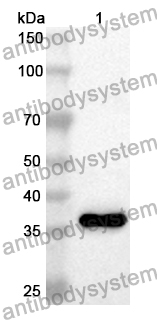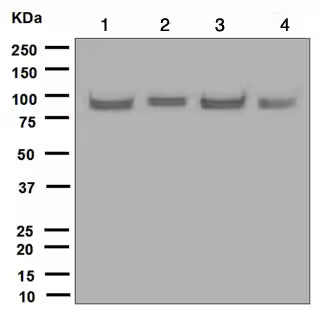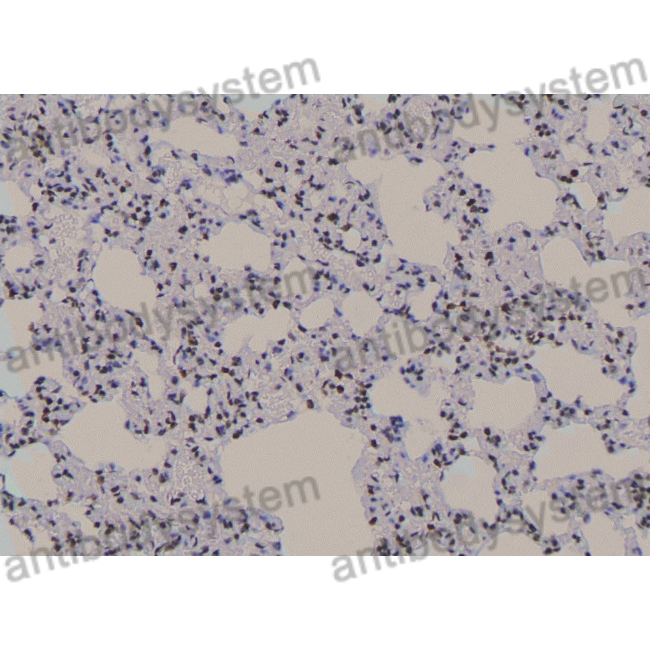Catalog No.
PHD23801
Species reactivity
Human
Host species
Rabbit
Isotype
IgG
Clonality
Polyclonal
Immunogen
E. coli - derived recombinant Human UBTF (Lys486-Arg549).
Tested applications
ELISA: 1:4000-1:8000, IHC: 1:50-1:100, WB: 1:1000-1:4000
Target
UBF, UBF-1, Nucleolar transcription factor 1, UBF1, Autoantigen NOR-90, UBTF, Upstream-binding factor 1
Purification
Purified by antigen affinity column.
Accession
P17480
Applications
ELISA, IHC, WB
Form
Liquid
Storage buffer
0.01M PBS, pH 7.4, 50% Glycerol, 0.05% Proclin 300.
Stability and Storage
Use a manual defrost freezer and avoid repeated freeze thaw cycles. Store at 2 to 8°C for frequent use. Store at -20 to -80°C for twelve months from the date of receipt.
Electron tomography reveals changes in spatial distribution of UBTF1 and UBTF2 isoforms within nucleolar components during rRNA synthesis inhibition., PMID:31479756
UVA irradiation strengthened an interaction between UBF1/2 proteins and H4K20 di-/tri-methylation., PMID:30610403
Nucleolar-nucleoplasmic shuttling of TARG1 and its control by DNA damage-induced poly-ADP-ribosylation and by nucleolar transcription., PMID:29712969
Phosphorylated nucleolar Tau protein is related to the neuronal in vitro differentiation., PMID:29684490
PICT-1 triggers a pro-death autophagy through inhibiting rRNA transcription and AKT/mTOR/p70S6K signaling pathway., PMID:27729611
Altered machinery of protein synthesis is region- and stage-dependent and is associated with α-synuclein oligomers in Parkinson's disease., PMID:26621506
Interpretation of an Extended Autoantibody Profile in a Well-Characterized Australian Systemic Sclerosis (Scleroderma) Cohort Using Principal Components Analysis., PMID:26246178
C6orf89 encodes three distinct HDAC enhancers that function in the nucleolus, the golgi and the midbody., PMID:23460338
[Systemic sclerosis autoantibodies: what dermatologists must know]., PMID:23395500
A quantitative analysis of transcriptionally active syncytiotrophoblast nuclei across human gestation., PMID:21883201
UBF levels determine the number of active ribosomal RNA genes in mammals., PMID:19103806
Pontin is localized in nucleolar fibrillar centers., PMID:18548265
RNA polymerase I-specific subunit CAST/hPAF49 has a role in the activation of transcription by upstream binding factor., PMID:16809778
Nucleolar protein upstream binding factor is sequestered into adenovirus DNA replication centres during infection without affecting RNA polymerase I location or ablating rRNA synthesis., PMID:16763197
Acetylation of UBF changes during the cell cycle and regulates the interaction of UBF with RNA polymerase I., PMID:16582105
[Ultrastructural localization of transcription sites of rRNA genes in the nucleolus of wheat]., PMID:15344322
Immunolocalization of upstream binding factor and pocket protein p130 during final stages of bovine oocyte growth., PMID:14613906
Autoantibodies to NOR 90/hUBF: longterm clinical and serological followup in a patient with limited systemic sclerosis suggests an antigen driven immune response., PMID:12136917
Autoantibody responses in Chinese hepatocellular carcinoma., PMID:11998899
Distribution and transcription activity of nucleolar DNA in higher plant cells., PMID:11913961
The role of acetylation in rDNA transcription., PMID:11600700
Immunolocalization of nucleolar proteins during bovine oocyte growth, meiotic maturation, and fertilization., PMID:11319160
Functional and molecular reorganization of the nucleolar apparatus in maturing mouse oocytes., PMID:10882521
Behavior of nucleolar proteins during the course of apoptosis in camptothecin-treated HL60 cells., PMID:10842321
Ultrastructural analysis of nucleolar transcription in cells microinjected with 5-bromo-UTP., PMID:10817672
The mitotically phosphorylated form of the transcription termination factor TTF-1 is associated with the repressed rDNA transcription machinery., PMID:10504331
Nucleolar localization of murine nuclear DNA helicase II (RNA helicase A)., PMID:10413677
The DNA binding domains of UBF represent major human autoepitopes conserved in vertebrates species., PMID:10230738
Phosphorylation of the rRNA transcription factor upstream binding factor promotes its association with TATA binding protein., PMID:9843972
The relationship of ASE-1 and NOR-90 in autoimmune sera., PMID:9818653
Nuclear distribution of human DNA topoisomerase IIbeta: a nuclear targeting signal resides in the 116-residue C-terminal tail., PMID:9743583
Nucleolar function and size in cancer cells., PMID:9588897
Immunohistochemical detection of ribosomal transcription factor UBF: diagnostic value in malignant specimens., PMID:9582531
Mammalian RNA polymerase I exists as a holoenzyme with associated basal transcription factors., PMID:9451438
Association of the nucleolar transcription factor UBF with the transcriptionally inactive rRNA genes of pronuclei and early Xenopus embryos., PMID:9378756
Specific interaction between human kinetochore protein CENP-C and a nucleolar transcriptional regulator., PMID:8702533
Detection of autoantibodies to nucleolar transcription factor NOR 90/hUBF in sera of patients with rheumatic diseases, by recombinant autoantigen-based assays., PMID:8702439
Intracellular distribution of HMG1, HMG2 and UBF change following treatment with cisplatin., PMID:8679707
RNA polymerase I associated factor 53 binds to the nucleolar transcription factor UBF and functions in specific rDNA transcription., PMID:8641287
The rDNA transcription machinery is assembled during mitosis in active NORs and absent in inactive NORs., PMID:8609158
In vivo evidence that TATA-binding protein/SL1 colocalizes with UBF and RNA polymerase I when rRNA synthesis is either active or inactive., PMID:8609157
The species-specific RNA polymerase I transcription factor SL-1 binds to upstream binding factor., PMID:8552083
The RNA polymerase I transcription factor UBF and rDNA are located at the same major sites in both interphase and mitotic pig embryonic kidney (PK) cells., PMID:8751374
Autoantibodies to the nucleolar organizer antigen NOR-90 in children with systemic rheumatic diseases., PMID:7783073
Clinical relevance and HLA association of autoantibodies against the nucleolus organizer region (NOR-90)., PMID:7699685
Molecular structure and function of autoantigens in systemic sclerosis., PMID:7650417
[The immunolocalization of the ribosomal gene transcription initiation factor UBF in the interphase and mitosis]., PMID:7571017
Immunodetection of the ribosomal transcription factor UBF at the nucleolus organizer regions of fish cells., PMID:7954874
Immunocytochemical characterization of human NOR-90 (upstream binding factor) and associated antigens reactive with autoimmune sera. Two MR forms of NOR-90/hUBF autoantigens., PMID:8072492
The RNA polymerase I-specific transcription initiation factor UBF is associated with transcriptionally active and inactive ribosomal genes., PMID:8306821



